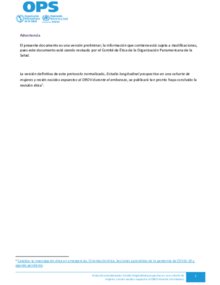Standardized protocol: Prospective longitudinal study in a cohort of women and newborns exposed to OROV during pregnancy - Preliminary version (available in Spanish)

|
The Pan American Health Organization (PAHO)/World Health Organization (WHO) have adapted standardized clinical and epidemiological research protocols and questionnaires aimed at addressing key public health issues related to Oropouche virus (OROV). As of July 16, 2024, 7,688 confirmed cases of Oropouche have been reported in five countries in the Region of the Americas: the Plurinational State of Bolivia (n= 313), Brazil (n= 6,976), Colombia (n= 38), Cuba (n= 74), and Peru (n= 287). During the last quarter, cases of Oropouche have been reported in areas and countries where no autochthonous cases had been previously reported. This protocol is designed to systematically collect biological samples, epidemiological, clinical and exposure data and share them rapidly in a format that is easily aggregated, tabulated and analyzed in multiple different settings at the regional level. We encourage all research centers to contribute to this effort regardless of their resource availability or patient volume, keeping in mind that ownership of the primary data remains with each individual country or center. *Document available in Spanish |
